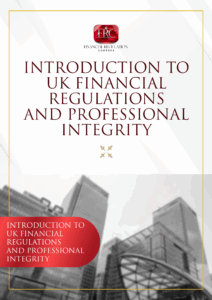Table of Contents
-
Introduction
-
Understanding FCA Accountability
-
Why Accountability Matters in UK Finance
-
What Is Level 4 Financial Regulation Certification?
-
How FCA Accountability Connects to Level 4 Certification
-
Benefits of Linking Accountability and Certification
-
Professional Integrity and Standards in Practice
-
Common Challenges in Aligning FCA Oversight with Professional Training
-
FCA Compliance and Level 4 Training
-
Global Importance of UK Standards
-
Studying the UK Financial Regulations Course
-
Helpful Resources
-
FAQs
-
To Sum It Up
Introduction
The UK financial system thrives on trust, transparency, and effective regulation. At the centre of this system is the Financial Conduct Authority (FCA), tasked with holding financial institutions accountable
and ensuring fair practice.
Alongside regulatory oversight, professionals gain knowledge and credibility through the Level 4 Financial Regulation certification, a structured programme that builds understanding of compliance, accountability, and professional integrity.
This article explores the link between FCA accountability and Level 4 certification, highlighting why both are vital for the stability of UK financial services.
Understanding FCA Accountability
The FCA is responsible for regulating conduct in retail and wholesale markets, ensuring that financial services operate fairly and transparently.
Accountability means the FCA must:
-
Protect consumers.
-
Ensure competition benefits customers.
-
Maintain confidence in UK financial markets.
-
Monitor and act on misconduct.
For more insights, see FCA compliance in Level 4 UK financial regulation training.
Why Accountability Matters in UK Finance
Accountability in finance underpins the entire system. Without it:
-
Consumers lose trust in institutions.
-
Markets weaken, becoming prone to manipulation.
-
Reputation declines, reducing London’s global competitiveness.
-
Systemic risk rises, increasing the chance of crises.
The importance of professional integrity in UK financial services shows how accountability extends beyond institutions to individual behaviour.
What Is Level 4 Financial Regulation Certification?
The Level 4 Financial Regulation certification is a comprehensive programme designed to:
-
Build knowledge of UK regulatory frameworks.
-
Enhance professional standards.
-
Strengthen compliance awareness.
-
Promote integrity in financial decision-making.
Explore what Level 4 Financial Regulation is and its real-world applications.
How FCA Accountability Connects to Level 4 Certification
There is a clear synergy between FCA oversight and Level 4 training:
-
FCA sets the rules → ensuring firms and professionals act responsibly.
-
Level 4 certification teaches application → equipping individuals to align their work with FCA expectations.
-
Together, they enforce a culture of integrity → reducing risks, protecting consumers, and maintaining stability.
The step-by-step registration guide for Level 4 training shows how professional development mirrors regulatory requirements.
Benefits of Linking Accountability and Certification
-
Career growth: Firms value professionals who understand both compliance and accountability.
-
Compliance expertise: Reduces penalties and reputational damage.
-
Consumer confidence: Demonstrates ethical commitment.
-
Employer trust: Aligns workforce training with FCA standards.
Employers highlight these advantages in why Level 4 UK financial regulation certificates are valued.
Professional Integrity and Standards in Practice
Regulation without integrity is ineffective. The career benefits of Level 4 Financial Regulation demonstrate that professional development must focus on values as much as technical compliance.
Integrity ensures that accountability becomes part of daily practice, not just a regulatory requirement.
Common Challenges in Aligning FCA Oversight w
ith Professional Training
-
Complexity of regulation makes it difficult for firms to keep pace.
-
Costs of compliance can burden smaller institutions.
-
Globalisation creates overlapping regulatory obligations.
-
Technology (crypto, fintech) introduces new risks.
See online vs in-person Level 4 training for how education adapts to modern needs.
FCA Compliance and Level 4 Training
Studying for Level 4 certification strengthens FCA compliance. It covers:
-
Regulatory expectations.
-
Ethical standards.
-
Risk and governance structures.
Professionals can explore resources for Level 4 Financial Regulation and apply knowledge whil
e working.
Global Importance of UK Standards
The UK is a global hub, and FCA accountability combined with professional training ensures international competitiveness.
This global impact is why many explore jobs after Level 4 training, which often open up beyond the UK market.
Studying the UK Financial Regulations Course
A structured UK financial regulations course helps professionals:
-
Understand FCA and PRA frameworks.
-
Embed accountability and ethics.
-
Gain practical compliance skills.
It is an essential step for those seeking to strengthen professional standards while aligning with UK regulation.
Helpful Resources
FAQs
1. What is FCA accountability?
It refers to the FCA’s responsibility to ensure fair, transparent, and ethical financial services in the UK.
2. What is Level 4 Financial Regulation certification?
It’s a structured programme covering regulation, compliance, and professional integrity in finance.
3. How are they linked?
FCA sets the rules; certification equips professionals to apply them.
4. Why is this important for professionals?
It boosts credibility, compliance knowledge, and career opportunities.
5. How can I study further?
By enrolling in the UK financial regulations course.
The UK financial system relies on FCA accountability to safeguard integrity and consumer trust. But accountability is only effective when professionals are equipped with the right knowledge and ethical grounding.
That’s where the Level 4 Financial Regulation certification plays a key role, bridging the gap between regulatory oversight and professional practice.
Together, FCA accountability and Level 4 training form the foundation of a financial services industry built on trust, compliance, and professional standards.

